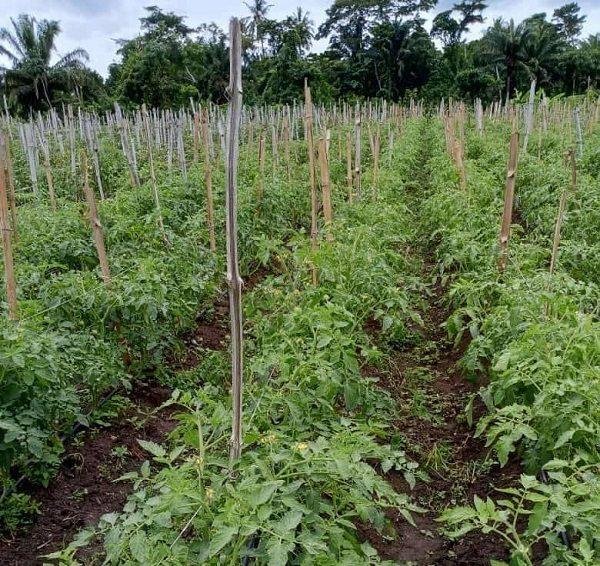Hot!
500-acre tomato, pepper farms established in Akuse

A portion of the tomato farm at Akuse
Over 500-acres of tomatoes and pepper farms have been established in Akuse in the Eastern region of Ghana.
The colossal private sector venture, undertaken by Nikgroup Farms, is aimed at reducing Ghana’s high import numbers of tomatoes especially, from neighbouring countries.
Mr Nick Owusu, the Chief Executive Officer (CEO) of the Group told The Spectator in an interview that the company aims to produce the two crops in large quantities for the local market.
“Our focus is to meet the demands of the local market but when we are able to produce in abundance, of course we’ll consider the international market,” he said.
But what actually excites officials of the company is the estimated number of employment opportunities the project would create for Ghanaians.
“We are very particular about the project; it means so much to us because it will create jobs for the teeming unemployed youth. They would work on the vast tract of land,” he added.
Additionally, the project, described as ambitious by Mr Owusu, would also aim to boost the local production of tomatoes and pepper.
“These two are major vegetables needed or used in every home and must come at affordable prices but it’s not so all the time. It is the reason why we want to produce so much so that even when it’s out of season, people would store enough,” he stated.
Mr Owusu said “the decision to set up the large-scale farm comes at a crucial time when Ghana is grappling with the challenges of importing a significant portion of its tomatoes and pepper needs.”
He noted that “by investing in local production, Nikgroup Farm is not only contributing to the country’s food security but also promoting economic growth and self-sufficiency.”
According to him, the project envisions a future where Ghana can meet its tomatoes and pepper demands through domestic production.
“Moreover, the establishment of this farm will bring the much-needed employment opportunities for the youth in the local community. With a focus on engaging the youth, Nikgroup Farm is committed to providing training and skills development programmes to empower the next generation of farmers and agricultural entrepreneurs,” he said.
He said the company was opened to organisations and individuals that wished to invest or go into partnerships by acquiring plots on the land and determine which of the two crops they want to invest in.
He explained that such investors would have the services of trained farmers who would be responsible for the daily operations on the land until crops were harvested and sold.
By Spectator Reporter
Hot!
Is the “Rev” title biblical?

In many Ghanaian churches, pastors are often introduced as “Reverend” or simply “Rev.”
The title is seen as a mark of respect, yet its biblical basis continues to stir debate.
While some Christians argue that it is a harmless way to honour church leaders, others insist it is unbiblical and should not be used at all.
Those who question the title usually point to the Bible itself. Nowhere in Scripture did Jesus or the apostles use “Reverend” for themselves or for one another.
Instead, they addressed each other as “brother” or “servant.” In Matthew 23, Jesus even warned his followers not to seek titles such as “rabbi” or “father,” teaching that all believers are equal under one God.
Critics also note that Psalm 111:9 describes God’s name alone as “holy and reverend” in the King James Bible.
To them, this means the word should be reserved for God, not for human beings. Others go further, citing Job 32, which cautions against giving flattering titles to men.
For such voices, the modern use of “Reverend” risks elevating pastors beyond what the Bible prescribes.
On the other hand, defenders of the title argue that it is not meant to replace God’s reverence but simply to acknowledge a minister’s role.
In many churches, “Reverend” is given to ordained ministers who have undergone training, much like the way a doctor is addressed as “Dr.”
The Bible itself, they point out, encourages believers to honour their leaders, with 1 Timothy 5:17 stating that elders who direct the affairs of the church well are “worthy of double honour.”
In this sense, the title is seen as a formal courtesy rather than a theological statement.
Supporters remind critics that Christianity does not operate in a vacuum but within cultural settings.
In Ghanaian society, respect for elders and authority is central to social order. Just as chiefs are addressed with titles such as “Nana” or “Togbe,” many Christians believe it is fitting to extend a similar courtesy to church leaders.
In their view, calling a pastor “Reverend” reflects Ghanaian values of honour and respect, and does not amount to worshipping a human being.
Yet the debate is far from settled. Some argue that the title has been abused, with individuals presenting themselves as “Reverend” without any proper training or accountability.
Calls have even been made for the regulation of church titles to prevent confusion and protect the credibility of ministry. Others, however, see no harm in its continued use, so long as it is not taken beyond what Scripture allows.
At the heart of the matter lies a bigger question: should Christians stick strictly to biblical language when addressing their leaders, or is it acceptable to adapt titles as society evolves?
The conversation is not just theological but cultural, touching on how Ghana balances respect for tradition with the authority of Scripture.
The debate over the “Rev” title is therefore not one with easy answers. What is clear, however, is that it forces us to reflect on how we show honour, how we interpret the Bible, and how faith interacts with our cultural practices.
As the discussion continues in church pews and on social platforms, we ask you: should pastors and ministers be called “Reverend,” or should Christians abandon the title altogether?
By: Jacob Aggrey
Hot!
Police confirm arrest of two suspects in Asankrangwa murder case

The Western Central Regional Police Command has confirmed the arrest of two men in connection with the fatal stabbing of a 20-year-old man at the Asankrangwa Education Area on Sunday, August 17, 2025.
In a statement signed by the Head of the Public Affairs Unit, ASP Beatrice Turkson, the police said preliminary investigations revealed that the deceased was chased and stabbed multiple times by a group of people.
The incident is believed to have stemmed from a misunderstanding between the deceased and one of the suspects, identified as 36-year-old Kwasi Opong.
According to the police, swift action led to the arrest of Opong and another suspect, 23-year-old William Francis Osei. Both are currently in custody assisting with investigations, while efforts are underway to apprehend another suspect who is still on the run.
The police noted that the body of the deceased has been deposited at the Asankrangwa Catholic Hospital morgue for preservation and autopsy.
“The Command assures the public that all persons connected to this heinous crime will be brought to justice,” the statement said.
The police appealed to the public to provide any information that could assist in the ongoing investigations.
By: Jacob Aggrey






